#sangjiu
Explore tagged Tumblr posts
Text
TTEOTM Easter Eggs Part 3 - Costume and Makeup Details
I love beautiful costumes, but even more when they tell a story! Here are a few of my observations. Did you spot anything else? (Spoilers!)
(1) The two outfits Ye Xiwu gifted Tantai Jin are both quilted. The purple costume is particularly unusual in that it's constructed like a blanket. In contrast, all his clothing in the hostage prince arc are not quite thick enough for Sheng kingdom's harsh winters. Ye Xiwu is literally bringing warmth to his life.
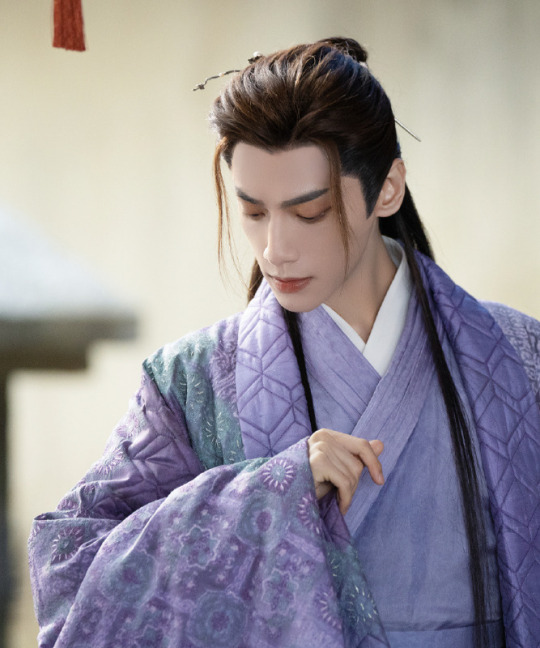
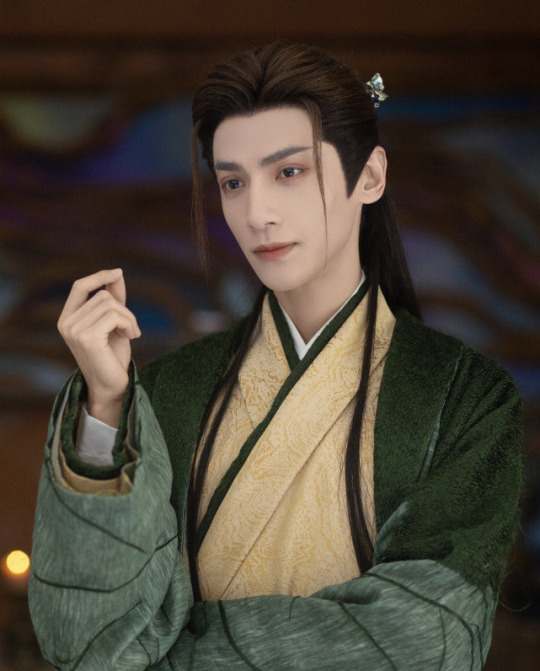
(2) TTJ and YXW wear similar costumes in their two love scenes - (1) Ep 2 - YXW's imagination of the drugged affair which led to their marriage and (2) Ep 39, where they finally consummated their marriage on screen. YXW wears the same pink costume. TTJ in different but identical-looking mustard yellow costumes.
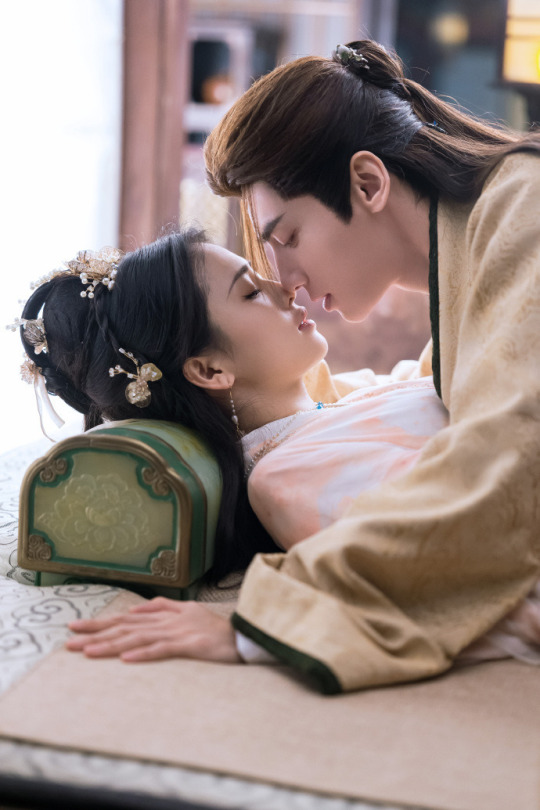
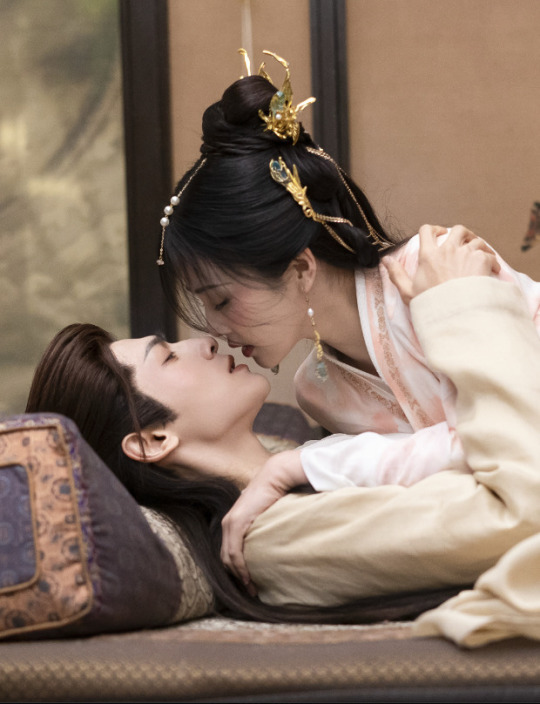
(3) Some viewers have criticized Ye Xiwu for not taking off hair accessories before going to bed, chalking it up to lazy filmmaking. This is not necessarily the case. In ancient China, upper class women did sleep with their hair-do and manage to keep elaborate designs in tack. How? By resting her neck, not her head, on the pillow.
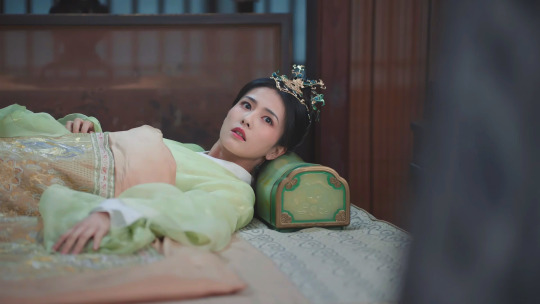
Ye Xiwu / Li Susu does go without hair accessories in a few occasions: when she is traveling, ill, depressed, and in mourning. It is most likely a creative choice to create a contrast between moments where her character is in control and powerful vs. vulnerable.
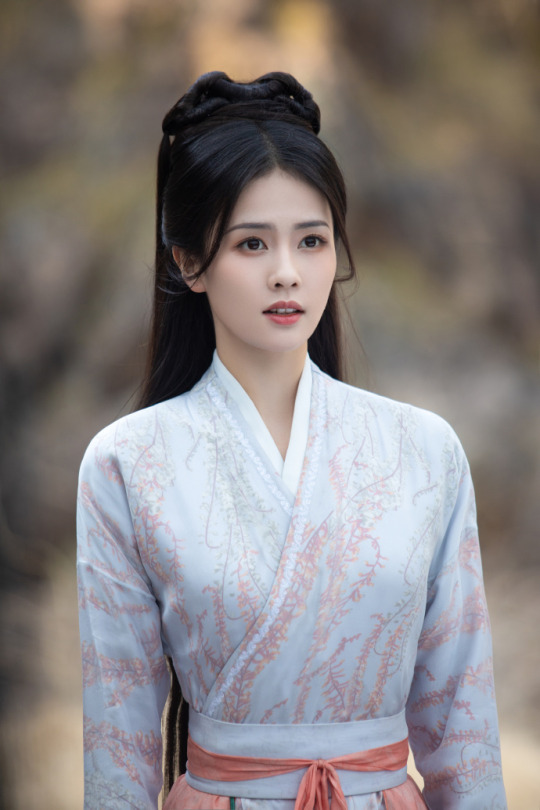
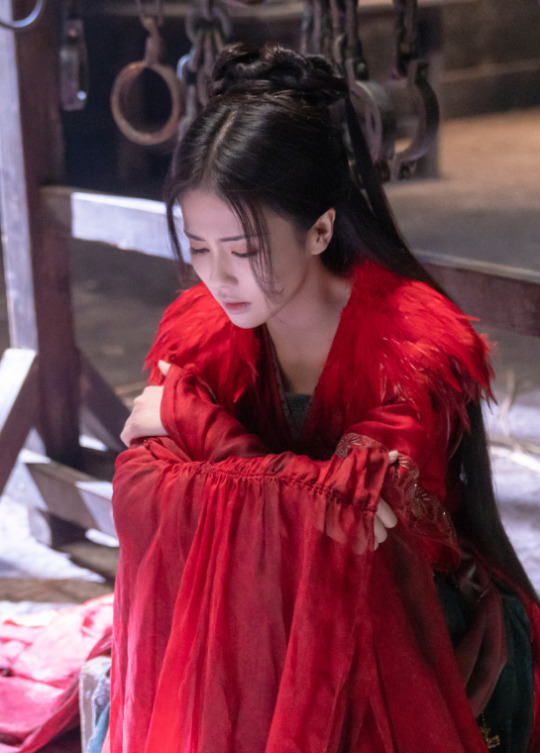
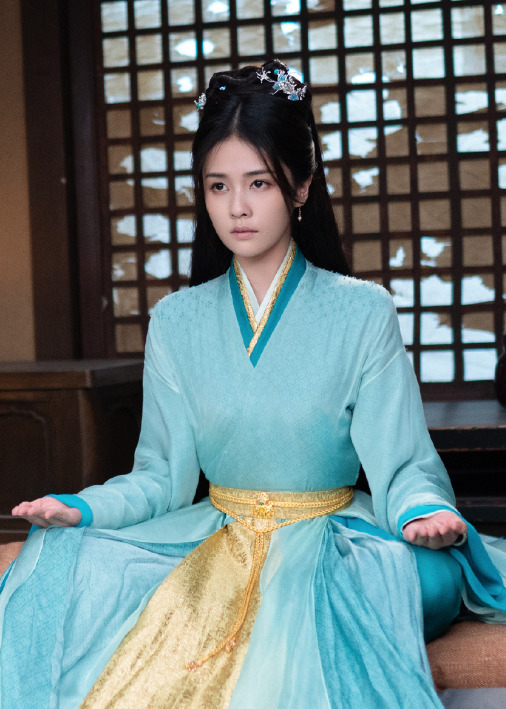
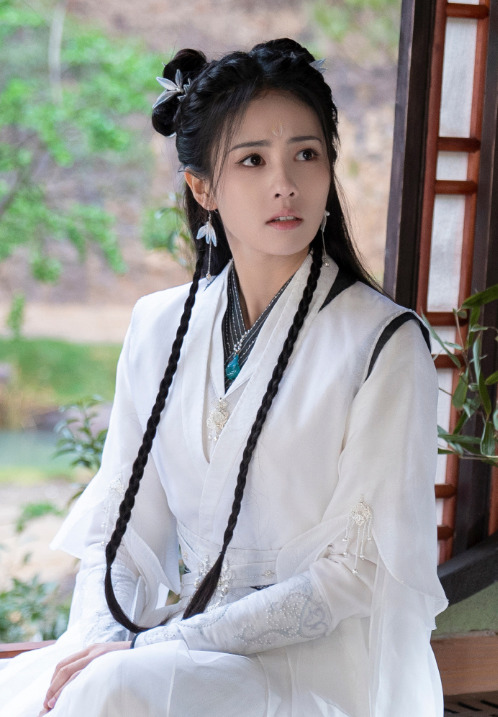
(4) All of Tantai Jin's female lieutenants wear red, from Pianran (after she starts working for him) to Siying and Monu. In fact, so does Tantai Minglang's lieutenant Fuyu. Red appears to be the career woman's color in this world!

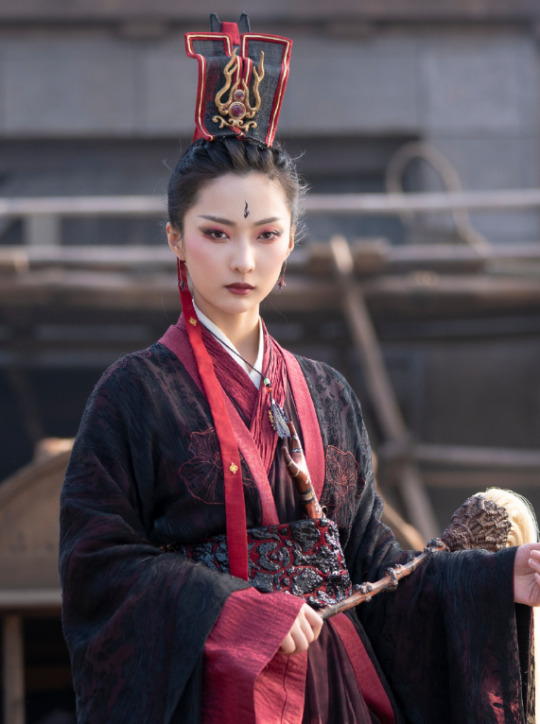
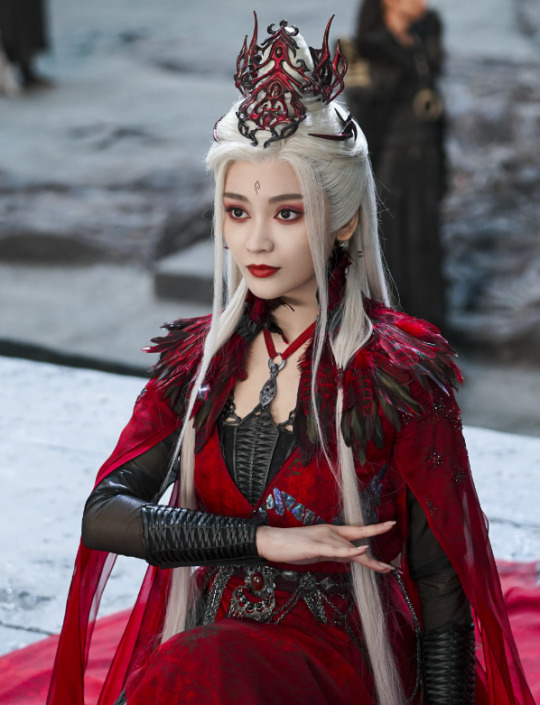
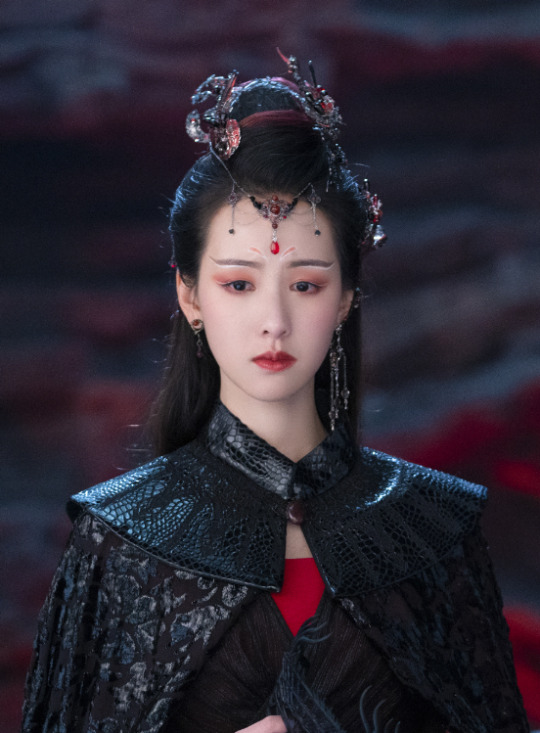
(5) After Mingye falls in love with Sangjiu, he adds the red waist scarf belt that's part of his wedding dress on top of his normally blue outfit.
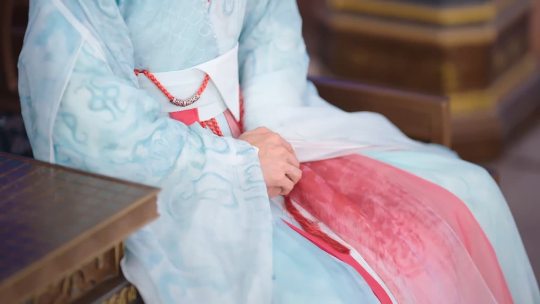
(6) The costume that Cang Jiumin (left) wears when refining the Dragonheart Shield echoes Mingye's costume (right) through the red/blue colors and collar design, reinforcing the connection between the two characters.
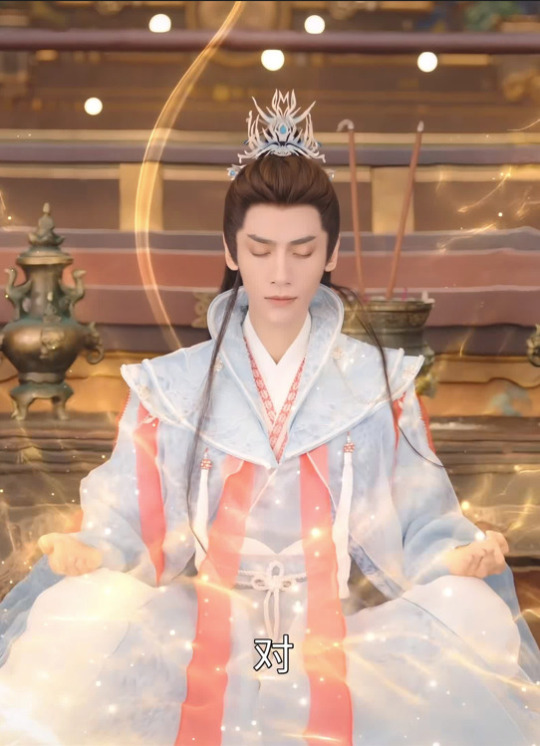
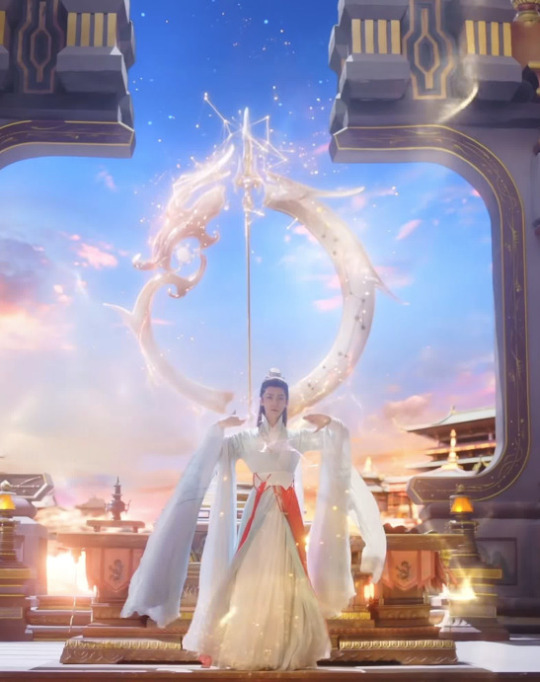
(7) The costumes in Bo're dream hint at the characters' true forms:
Mingye (dragon): dragonscale armour & patterned clothing
Sangjiu & Sangyou (clams): pearls & shell motifs
Tianhuan (snake): gold serpent hair crown & bracelets
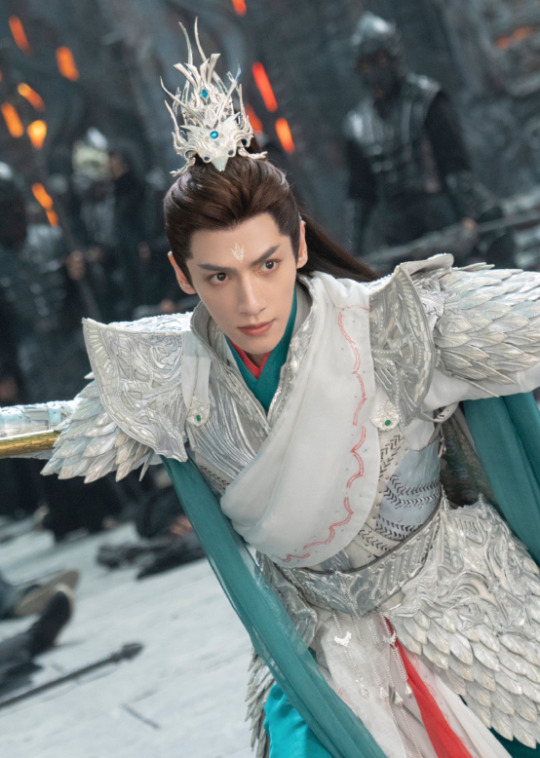


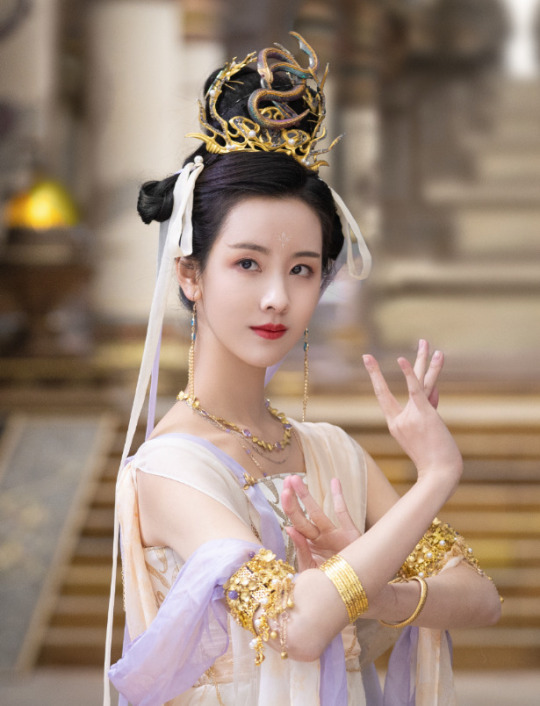
(8) Throughout the drama, only characters in the Upper Immortal Realm go full Dunhuang Feitian style, characterized by bandeaus, scarves, layers of drapery, sleeveless (similar to Indian clothing).

The style is used in formal occasions or to confer power or godliness. For example, Sangjiu goes Dunhuang with sleeveless draping outfits at her wedding and after she goes dark.
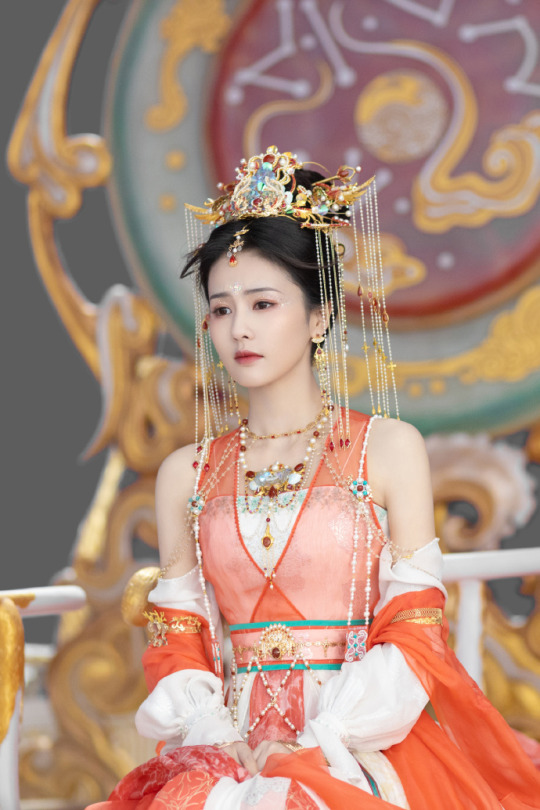
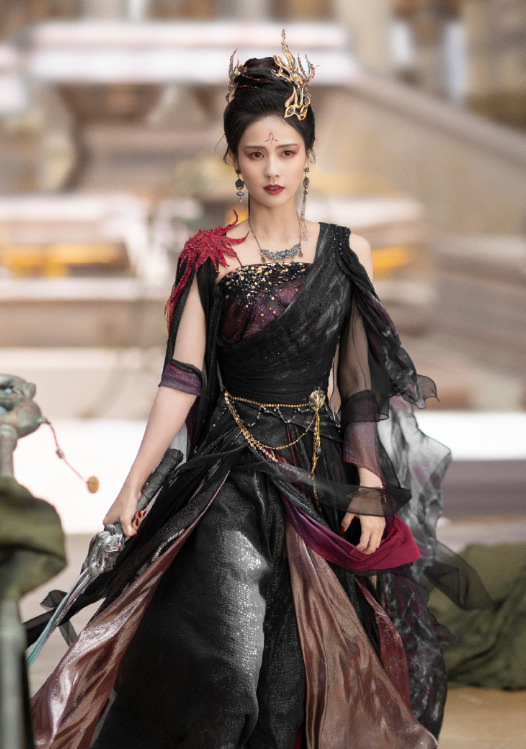
Similarly, when Susu and Tantai Jin become gods at the finale, they also take on a new Dunhuang-style outfit. In fact, the multi-color drapery of Tantai Jin's outfit seem to be an amalgamation of the fabric used in the twelve gods' outfits.
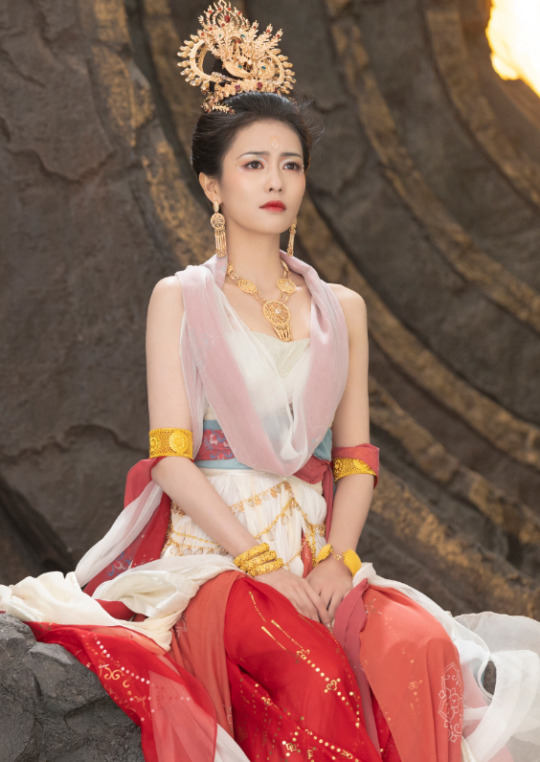
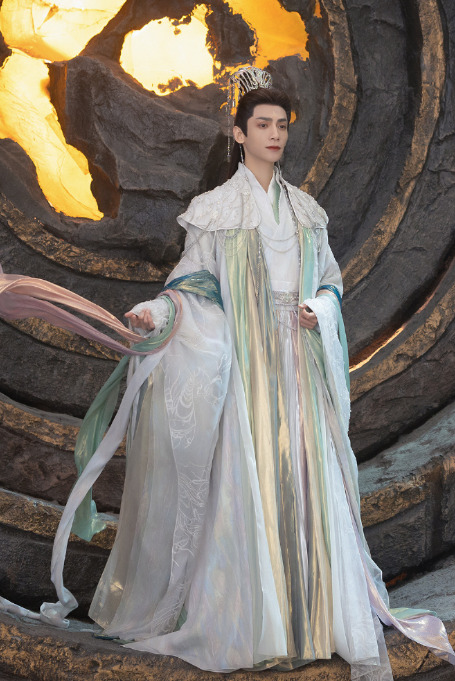
(9) Members of the Moon Tribe all wear long wavy hair, chunky metal and coin ornaments, and hair braiding.
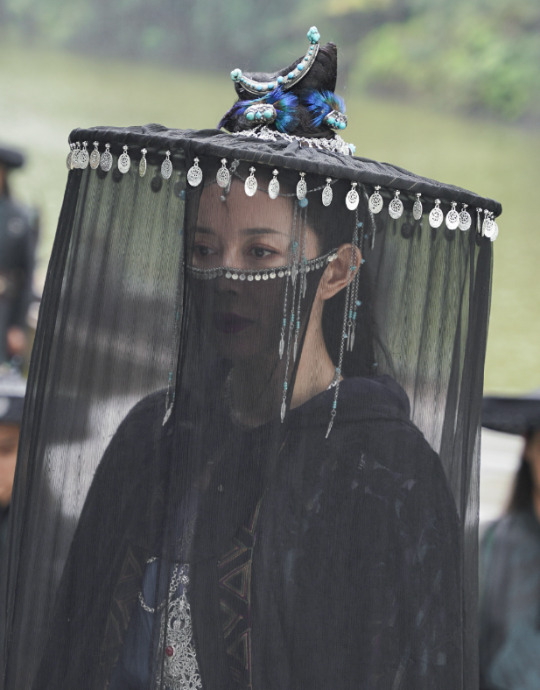

Tantai Jin follows the dress code when he stays with the Moon Tribe before entering the spiritual dimension.
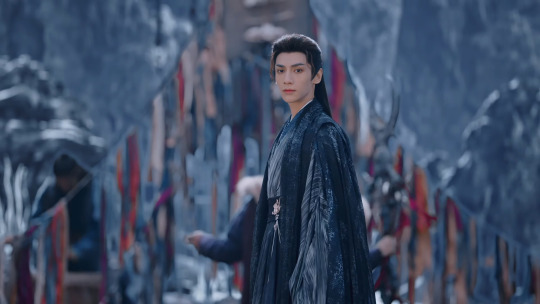
Guess who also loves his wavy hair, metallic accessories, and leather? Of course it's the Ancient Devil God, again reminding viewers of his connection to the tribe.
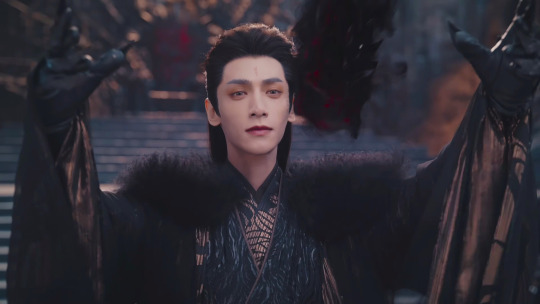
Bonus: Luo Yunxi mentioned in an interview that his characters (hostage prince, emperor, Mingye, Devil Gods) all have different hairpieces/wigs. He had to take off and reglue his hair between scenes.
#till the end of the moon#luo yunxi#black moonlight holds the be script#cdrama#chang yue jin ming#chinese drama#tteotm#tantai jin#bai lu#ye xiwu#mingye#sangjiu
354 notes
·
View notes
Text

Shoutout to the sea witch Sangjiu and her dragon BF!
4 notes
·
View notes
Text
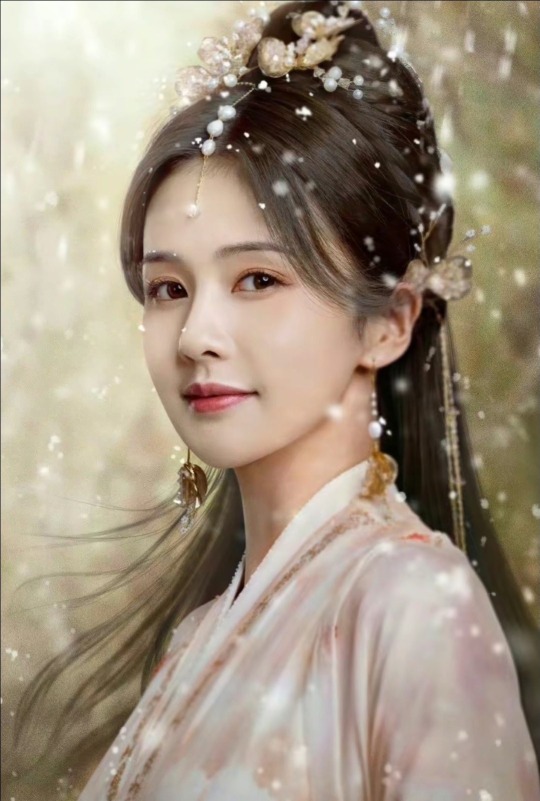


Thank you bailu for such a memorable performance in tteotm!!! 💕💕💕😭
23 notes
·
View notes
Text
So Ye Xiwu trying to kill Tantai Jin on their wedding night was essentially the heart guarding scale vs the world overturning jade
Aka Mingye and Sang Jiu’s second divorce


#in ep 18 lss was like. I hope one day mingye and sangjiu can me reunite or something like that. and it’s like. yeah they sure will girl#till the end of the moon#tteotm#cyjm
13 notes
·
View notes
Text
???? MINGYE'S "IT'S MY FIRST TIME BEING A HUSBAND" LINE IM SO BNING ON THE GROUND
#i know some people dont like the dream arc but#ming ye and sangjiu have my entire heart#especially the ost 要不然我们就这样一万年#till the end of the moon
10 notes
·
View notes
Note
List 5 things that make you happy, then put this in the askbox for the last 10 people who reblogged something from you! get to know your mutuals and followers :D
heiaaa hii
HELLOOOOO!!! hmmm five things that make me happy.
that specific cookie chocolate. it's good and i love it
music !! i love music
day long trips... train trips... my beloved
a cdrama till the end of the moon and how pretty all the costumes/jewerly/everything is. ooo i see a pretty headpiece and go all 🥰🥰🥰 ohhh the hairstyles. I MEAN THE STORY TOO although half of the times it gets me yelling NO DONT DO THAT OH MY GOD im really enjoying it and watching it makes me very happy. yippee.
and my friends <3 love them all mwah
#yen's sunflowers#can i say i rly like tteotm#LIKE#IM OBSESSED#oh im gonna cry (one tear) when im finished with it#we will see whether because the drama itself breaks my heart#or because i finished it#AHAJAHSHD#sangjiu's wedding headpiece was SO fucking pretty#same goes for bingchang's#guys u dont understand i went on a whole ass spam when i saw her during that ep#like i just spammed my friend with low quality screenshots of her#and of ye xiwu's too#they both looked soooo pretty#ngl ye xiwu always looks pretty.#actually both sangjiu and sangyou looked SO good in their tribe's outfits#like. generally i rly love the direction? looks? they went with tribe#it looks so pretty#HONORARY MENTION pianran <333#LOOK the actress is so pretty#im in love#i generally really like pianran AND GOD I HOPE NOTHING HAPPENS TO HER#lan'an also is soooo pretty#i think generally yiyue tribe has really pretty clothes and so#but lan'an is just. really really pretty#still sad over her#yingxin's also super super pretty#everyones in yiyue tribe is so pretty. save for that one annoying betrayal dude ass mf#sorry im shutting up now LMAO
9 notes
·
View notes
Text
The dream arc of what happened 10000 years before is just painful. They just suffer constantly. They switched roles. They still just want to be happy. When Tianhuan cut the tree I wanted to cry. When Sangjiu stayed in the pool to purify herself even if she was burning just so she wouldn't bother Mingye I almost did.
I'm always like, "you should watch Chinese dramas they are so funny and silly". And then get emotionally crushed every single time. Good fantasy shows are not dead, you just have to let go of netflix. Take my hand and suspend your disbelief ✨✨
#till the end of the moon#cdrama#chinese drama#fantasy#tantai jin#ye xiwu#ming ye#sang jiu#I'm such a sucker for finding each other in different lives
29 notes
·
View notes
Text
The symbolism of food in Till The End Of The Moon: Between survival, love and agency
Food is an important element in different societies and cultures, holding a multitude of symbolic meanings. It not only expresses but also establishes the relationship between people and their environment, and constructs social status and order. In the drama, food is an essential symbol for Tantai Jin's character development and his blossoming relationship with Ye Xiwu/Li Susu. Food is also relevant to Mingye and Sangjiu's love story and Ye Bingchang's fall from grace. Rooted in Chinese eating culture, food in TTEOTM becomes a symbol not only of love but also of agency.







Food as love
Tantan Jin's early life is marked by the absence of both love and food. From birth, he and his maids struggle to survive in the cold. Here he learns that survival is paramount, even if it means sacrificing his dignity. The lack of food and love continues into his early adulthood. When he is offered food, it is often tainted with humiliation or even poison - such as the poisoned moon cakes prepared by Ye Xiwu that eventually lead to their marriage, or the drugged last meal prepared by Yue Yingyue before she plans to murder him.
At the Ye estate, he is excluded from family meals and starved by the servants. It's only when Li Susu witnesses the extent of the abuse that she intervenes - with her own agenda in mind. At first, he is suspicious of her offers of food, but soon warms to her acts of kindness. From this point on, food becomes a symbol of their growing relationship.
This is also reflected in Mingye and Sanjiu. Sanjiu's naive but good-natured character is shown in scenes in which she gleefully eats fruit from the divine garden. The drop of an apple brings the couple closer together, while her feeding and healing of Mingye during his blindness is an expression of their love for each other.


Li Susu makes sure that Tantai Jin has enough to eat - even during their escape from Tantai Minglang's troops, she offers him fish and fruit. Once reunited after the dream, Tantai Jin kills and cooks a whole flock of geese that have frightened his wife (by his own design). He also gives her sweets later in the palace. On Pianran's advice, Li Susu starts cooking ("crappy") food for him. (She's trying her best, okay? I can't imagine how bad it must taste for a man who ate dirt and rats to stay alive to have to force it down). His love for her is evident in the way he still encourages her to cook and improve, appreciating her cooking attempts as an expression of his affection. It is for this reason that Li Susu's alleged attempt at assassination via food cuts so deeply. Not only does it disrupt the symbolism of love, it also ties into an earlier pattern of betrayal that makes him question the sincerity of everything that has happened in between..
Food as agency
The symbolism of food isn't limited to love. It becomes a marker of agency - or lack thereof. For the longest time, food is out of Tantai Jin's reach because he has no agency in his own life. He depends on the kindness and compassion of others. Once on the throne of Jing, he uses food as a measure of political power, forcing his suspicious officials to share a traditional bowl of soup with him. As king, he wants to alleviate the suffering of his people so that no one else in his country has to endure hunger as he has.
Later, in both instances of Li Susu's imprisonment by Tantai Jin, she refuses to eat - taking back the only agency and power she has left. She only continues to eat after she has devised a plan to extract the evil bone.
Another example of the link between agency and food is Ye Bingchang. As a woman dependent on her family and future husband, she lacks agency in most respects. Cooking and sharing food is one of the empowering acts she can perform. In the first episode, she is seen feeding the poor, one of the few acts of service she can perform that shows her kindness and virtue. However, as the show progresses, she uses food to gain favour (bringing Tantai Jin soup after he rescues her from Sheng), and later poisons the food of both Tantai Jin and her grandmother in revenge. Finally, she takes her own life by eating the poisoned rice Tantai Jin had prepared for her.
Food in the third arc
In the final arc, food becomes less important. It only appears in relation to Chang Jiumin's sect brothers and Shifu, symbolising familial love. It does not appear in the relationship between Chang Jiumin and Li Susu. It's only mentioned once in the dream by Ye Xiwu's family, again as a symbol of familial love.


This could mean that the food metaphor has transcended Tantai Jin's obsessive love for Ye Xiwu - which has become healthier and now extends to other people around him. Maybe it's because he's grown in his time with the Immortal Sect, or maybe the missing scenes were cut in the final cut.
🍜🍚🥢
51 notes
·
View notes
Photo





Cdrama: Till The End of The Moon (2023)
His smile 🥰 #tilltheendofthemoon #mingye #sangjiu
Watch this video on Youtube: https://www.youtube.com/shorts/hzI4OjMUoaM
#Till The End of The Moon#长月烬明#Hei Yue Guang Wen Na BE Ju Ben#Yue Zhao Qian Feng Wei Yi Ren#Zhang Yue Jin Ming#Zhang Yue Wu Jin#2023#Youku#cdrama#chinese drama#youtube#shorts#short video#Luo Yun Xi#Tantai Jin#Cang Jiu Min#Ming Ye#Bai Lu#Li Su Su#Ye Xi Wu#Sang Jiu
30 notes
·
View notes
Text
message from the scriptwriter of Till the end of the Moon 长月烬明 - 边距何妨
If Changyue Jinming is disassembled, what kind of script is it? It consists of three main lines: the mission of the heroine, the growth of the hero, and the game between gods and demons. The former two are intertwined with each other, and the latter emerges gradually, and finally climbs up the stairs with the audience, overlooking the Three Realms and looking back at the floating life.
(Google Translate with some corrections - very long post but really really interesting and worth a read. apologies for inaccuracies. link to original above.)
Changyue Jinming has come to an end, and it's the screenwriter's turn to be on duty for the main creation and sharing activities. Just for my job, I will chat with you about the adaptation of Changyue Jinming's script, which can be regarded as a belated work report from 2021.
1. All nutrition comes from the soil: classical culture and oriental mythology
Long before the birth of the Changyue Jinming project, the audience's complaints about xianxia characters were enough to (fill a channel?). Year after year, colleagues are working on the Xianxia project day and night, and the goal everyone is striving for is "different". This is also the most difficult problem that Changyue faced at the beginning. One foot of fertile soil supports one inch of seedlings. So the script went back, looking for the place of growth in the classics.
Our country has an extremely rich tradition of myths and ghosts, and it has its own style from time to time. Based on the original work (novel), the adaptation finally chose classical mythology as the nourishing soil. They are rich and intense, tragic and magnificent, full of primitive vitality, and an irresistible sense of destiny. This is the world that the script adaptation wants to build.
With soil, all details can grow naturally, such as:
In the first act of the story, the Demon God appears. How should the demons in the fairy world appear? Maybe he can fly, he can blink, or he can punch a mountain first. On a night when pulling my hair out, the document was typed and deleted, and finally, "In the purple sky, six black dragons drove a chariot, breaking through the clouds and passing by the sun. Jeweled bells at the four corners of the chariot swayed, The sound spreads ten miles", covered by the curtain, blown away by the wind, revealing the true face of the devil.
In this way, the demon god appeared on the stage with the dragon driving the chariot and riding the wind and breaking the clouds. The script wants to use the image of "Dragon Driving" to give the demon god the mystery of ancient times and the flavor of Chu Ci (Songs of Chu, a book of ancient poetry).
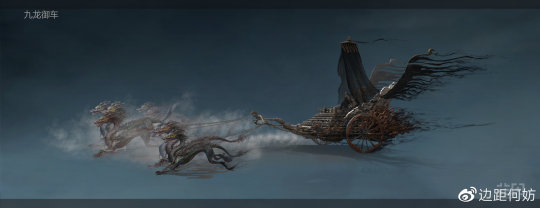
As for the image of Sangjiu, although it is a clam in terms of species setting, in the script adaptation, her image and aesthetic characteristics actually come from the dragon girl and the jiaoren (mermaid like creature). In classical culture, the images of Dragon Girls are constantly changing. They are heterogeneous, lower than the gods of the water tribe. They once offered pearls to the gods and were enlightened by the gods. They initially had the wildness of animals, and gradually evolved with the creation of classical literature to become beautiful, smart, and passionate.
Sang Jiu is exactly such an image. She is innocent and sentimental, but also has the vigilance of a small animal. She is not only a soft princess who holds her face up to the God of War, but also a vigorous girl with a longbow on her back and kills magic soldiers. During the days and nights when she married, like a jiaoren weeping pearl tears, she gathers them every night, tasting the bitterness of love.
The prop "mirror of the past" in the novel is adapted into the eyes of the god Jize in the script. The transformation of gods into things after death is one of the traditions of Chinese mythology. Just like those myths we have been familiar with since childhood, after Pangu died, his left eye was the sun and his right eye was the moon. Kuafu chased the sun and died, and his walking stick fell to the ground and turned into a peach forest. The ancients believed that when a tiger died, its eyes fell to the ground and turned into amber (tiger soul). When the divine body fell, Jize's gentle gaze turned into a divine mirror, illuminating the last hope with his spirit.
After all the creatures in the Mo River were slaughtered, Sang Jiu pulled out the water suppressing stone in the center of the river in extreme grief and indignation. "The water town stone, which is extremely heavy, rises from the bottom of the river. For a moment, the mud and sand in the river rolled, and the sand flew away." Sang Jiu turned the water suppressing stone into a sharp sword, killing Shangqing God Realm. It is remade into the (ocean god's needle, another name for Sun Wukong's golden cudgel).
Another example is the Tianzhu (Celestial Pillar) supporting the heaven and the earth, which is actually a complex of images such as Buzhou Mountain and wood. The script does not directly copy their names, but everyone will naturally think that this is the power of convention. The Spring Water Throwing Festival draws on traditional elements such as Nuo Opera and Tournament of the Gods.
2. Composition of the World: Human World, God Realm and Immortal Gate
The story of Changyue Jinming spans three distinct sections: the human world, the divine world, and the immortal's realm. Simply running the map will obviously split the story, so geography and time are used to weave them together in the adaptation of the script.
Geographically, the gods once lived around the Tianzhu, but now it is in ruins. The fairy gate is located in the human world, and practitioners have close contacts with ordinary people.
(1) The world of mortals
What is the human world like?
First of all, in terms of setting, it has a "king" and no "emperor". It must be set before the Qin Dynasty. The kingdom is divided, but the hearts of the people still yearn for unity. But it didn't land in any real dynasty or country, which is the inevitable result of fictional dramas. Secondly, its atmosphere and details must be separated from real life. It must have an ancient style and a floating mythological flavor. Therefore, the world view of the world is taken from a fictional classical myth:
In this world, there are demons, warlocks, magic weapons, and tyrants. There are princes and grandsons who practiced down the mountain, there are blood boiled in a cauldron, and there are prophecies about the return of destiny. There are immortals who fall into the mortal world and wander around the world, and there are magic weapons who leave the faction to help in the battle. The generals use immortal methods to fight against each other. In this world, the reference is the world view of "Investiture of the Gods" that everyone is familiar with.
The role of Pang Yizhi borrows some of Jiang Ziya's symbolic characteristics. They are all uncles who were driven down the mountain to do tasks. Jiang Ziya is confused about life in the world, and Pang Yizhi is also unreliable and cute. They are proficient in divination and bear a destiny that they don't know. Jiang Ziya was not destined for immortality, and in the end, Pang Yizhi also went to a similar fate.
Among the many characters who abandoned business and invested Zhou in the Romance of the Gods, Huang Feihu is the one who is most similar to Ye Qingyu. They are all relatives of the king, the town country and the Zhu country. Both have a father who is a veteran of the town. In the end, he was forced to have no choice but to defect to his former enemy with his family.
The contrast in the Romance of the Gods is the two princes Yin Jiao and Yin Hong. They once entered the mountain gate to practice, received advice, and obtained magic weapons, but they chose to be loyal to their father, King Zhou, and eventually died. Although Fengshen Yanyi has a critical attitude towards the second son, the script wants to use a more neutral attitude to praise and regret Xiao Lin's life choices. Camellia fell to the ground and fell into the mud, how can one not regret it?
In this world, the atmosphere of myth is like a shadow, just like the song sung by the crow and the news from afar that it relays. The smoke from the witch doctor's burning enveloped the palace, and the shadow of the demon lingered in the market.
In the capitals of Jing and Sheng, huge wreckage can be seen faintly in the distance. In the garden of King Jing’s Palace, there is a closer piece that was tied to a swing. The fragments that fell into the world, the traces of gods are everywhere. I saw some netizens asking what it is, but it doesn’t matter if you can’t see what it is. This weird spectacle itself has formed the atmosphere of this world and isolated it from the real history.
(2) The place of the gods
The fragments of Tianzhu are the hardware connection between the human world and the god world, and the dream of Prajna (aka Bo're) Floating Life is the software connection between the current human world and the god world ten thousand years ago.
The Prajna Floating Life narrated in the novel has only five episodes in the script, and it has to be divided into two parts with clear boundaries: the part of the battle between gods and demons, which bears a large amount of information and logic chains serving the whole play, Ming Ye's love story with Sangjiu has to be compressed into another part and cannot be unfolded, so the script is treated as a three-act drama structure, making it present the style of a short fable, and acting for the four audiences who enter the play.
The flavor of this ephemeral world, on the one hand, is composed of countless light and small fragments, such as the Qingluan (Blue Luan bird) car, the flying dance, and the fairy fruit tree. On the other hand, it is supported by the god system.
In classical mythology, gods present different styles, for example, the familiar job-type gods that constitute the management system of heaven, such as the Jade Emperor, the Queen Mother, the Three Officials, the God of Wealth, and the Elder Moon. There are also natural gods, such as Jumang, the god of wood, Gonggong, the god of water, Zhurong, the god of fire, Wangshu, the god of the moon, and Xihe, the god of the sun. The adaptation of the script chose the latter system, utilized their cultural elements, and at the same time avoided the names of real myths, and constructed twelve gods for the ShengQing realm.
The reason for choosing the latter is that the style requires a more distinct sense of antiquity from the gods and a more primitive source of power. They have the existence form of matter, natural phenomenon, and matter movement. Except God of War. Compared with other gods, this special position changes faster. If you are a god by battle, you will often die in battle. In terms of seniority, Ming Ye, who came to Shangqing alone from the East China Sea and was ordered in danger, is still a young junior in the eyes of his colleagues, but the duty is that the God of War must charge forward and die. The twelve gods finally died. They came from nature, and returned to nature. Gods are supposed to be ruthless, but when they sacrifice, they are compassionate. It is indescribable that a ruthless god, who was supposed to live the same life as the heaven and earth, died for the short-lived sentient beings.
As for the setting of the demon god, the adaptation of the script liberates it from the framework of "a villain". It has no ambition, no desire, no likes and dislikes, no sorrow and joy, and it is not even a living body, but some kind of energy, or universal law. If all living beings in the three realms are immortal, there will be endless sorrow, resentment and anger. The accumulation of misery for hundreds of millions of living beings will take the form of demons and gods, which is irreversible. It's like a sick body with malignant sores, bright and festering. Even if the bones are scraped and dug away, it will only remove the incarnation of the appearance. The Demon God is like an invisible cloud, always floating over the world, and no one knows whether it will appear next time ten thousand years later or tomorrow.
In the battle of gods and demons, in order to avoid fighting all over the world without any support, the script delimits the battlefield in front of the Tianzhu. At this moment, the whole world is embodied as this huge divine pillar behind him. If the pillar exists, the world will be safe, and if the pillar falls, the world will be destroyed. The furious demon god showed his wrathful appearance, like (the myth of) Gonggong crashing into Buzhou Mountain and smashing the Tianzhu. The god perishes, turns into a war halberd, and supports the world again.
After the fall of the gods, in fact, an era has come to an irretrievable end, and even if Ming Ye is alive, he is powerless to change it. The essence of the contradiction between Teng Snake-Tianhuan and Ming Ye-Sangjiu is the reshuffle of power after the Great War. When the era of gods came to an end, the aristocratic forces Teng Snake immediately launched a counterattack. (?)
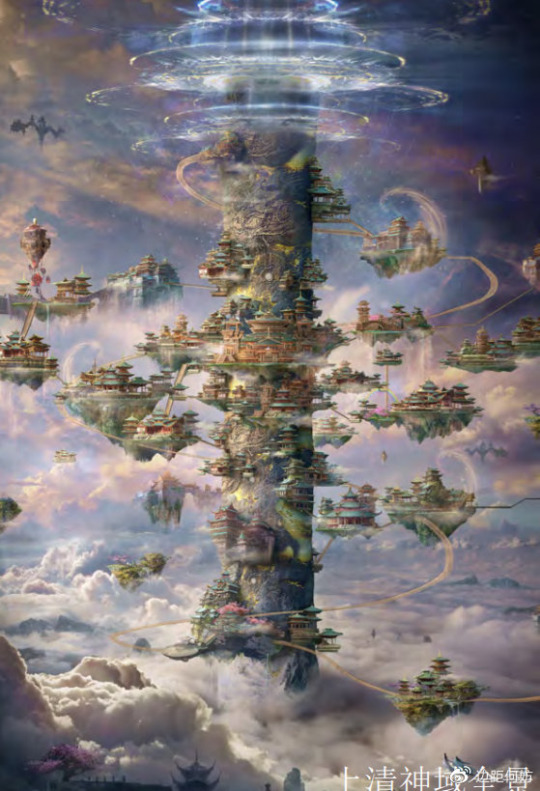
(3) Between man and God
After the Great War between the gods and demons, the collapsed pillars of heaven scattered across the world, becoming spiritual veins everywhere, and mortals gathered to practice, and fairy gates gradually emerged. The gate of immortality is outside the world of mortals, and the cultivators themselves come from the world. They are both troubled by the seven emotions and six desires, birth, old age, sickness and death, and they also have the method of detachment. Trekking from the mortal world to the immortal road is for practice.
Hengyang Sect and Xiaoyao Sect are the two sects where the protagonist belongs. In the adaptation of the script, Hengyangzong was endowed with some Mohist spirit. They have strict discipline, and they practice hard in the sect; they pay attention to the hardships of the world, and their disciples take turns going down the mountain to exorcise evil spirits;
At the beginning of the story, the Xiaoyao Sect was in a hurry, and the Hengyang Sect went up to the head and down to Li Susu, the younger junior sister, to rush to the rescue. But when the demon god came to Hengyang Sect, knowing that the strength of the two sides was extremely different, the disciples of Hengyang Sect still lined up neatly, "The disciples of Hengyang Sect are guarding the Mingwu Hall today, the sect will not stop, and the barrier will not be broken!" Disciple's spiritual inheritance of "go through the water and die, never die".
The spirit of Zongmen and the teachings of Qu Xuanzi's love deeply influenced Li Susu, not only made her " virtuous", upright and bright, and always insisted on kindness, but also made her persevere like iron and never give up an inch, even if her heart was broken and her body was crushed. Broken Soul also has to complete the task. Even in the deepest darkness, in the most painful despair, when all previous efforts have been abandoned and the heart is ashamed, I still choose responsibility.
The Xiaoyao School, on the other hand, infused more of Zhuangzi's spirit, and the whole school set the goal of being free and contented in life. When Hengyang Sect disciples study by themselves from five to nine, they are doing BBQ; when Hengyang Sect disciples are doing tasks, they are fighting Demon God Killer; They are all waiting for the occasional sun to come out and quickly dry the quilt and pants.
Cang Jiumin, who was blinded by happy education, finally got rid of the heavy shackles that could not be worn away by five hundred years of nether water, "Forget about things outside, and forget about yourself inside". He walked forward under the trust and protection of Master, and the clock stopped in his heart and finally started to turn again. Saving people with the God-killing Crossbow was a rehearsal of self-reflection, and after refining the Huxin Lin, Tantai Jin completely reconciled with himself, "Today I know that I am me", from a single thought of a god and a devil to a body of a god and a devil. Since then, all the coercion and temptation of monsters and the lobbying of ancient demon gods have lost their magical power. The fate of the world has thus changed.
Xiaoyaozong is shrouded in clouds and mists all year round, and the sun is not visible, but the junior brother Cang Jiumin is here to push through the clouds and mists, and suddenly see the light. Zhuangzi's " Heaven, earth and I were born side by side, and all things are one with me" is the state of the gods in the play.
3. Fate and Breaking Fate
The three magic weapons that appeared in the original work: Mirror of the Past, Qingshihua倾世花 (World overturning flower/jade), and Huxinlin护心麟 (dragonheart shield), their names are kept in the script, but their origin and function have been adapted. They constitute three intertwined long and short lines, connecting the past, present and future destiny.
In the catastrophe of annihilation, Li Susu was brought back five hundred years ago by the mirror of the past. She struggled to find Jize and witnessed the moment when Jize fell and transformed into the mirror of the past. Fate drew a circle at this moment, she found him, witnessed his death, and his death sent her to him.
Sang Jiu is enchanted, and the Tu Jin Teng Snake Clan refines the world-famous jade. Tantai Jin chose it because of the despair of quenching thirst by drinking poison, while Li Susu replaced it because of her unrelenting protection, and the inevitable fate of death will connect the two closely, just like Ming Ye and Sang who engraved each other with regret in Prajna Floating Life liquor. In the end, Li Susu turned the world-overturning jade, which was originally an evil thing, into divine marrow, and replaced Tantai Jin's evil bone with it.
And Hu Xinlin, originally from Ming Ye's heart to save the world, shaped the Buzhao Mountain full of fairy spirit, gave birth to the Xiaoyao Sect, and was brought to the world by Pang Yizhi, a disciple of the Xiaoyao Sect. After changing hands several times, he was finally rescued on the wedding night. They killed Tantai Jin, let him come to Xiaoyaozong alive, and reshaped Hu Xinlin.
Behind the three artifacts are the eyes of Ming Ye, Sang Jiu, and Jize who have been watching silently through thousands of years.
In addition to magic weapons and artifacts, the script runs through a large number of prophetic plots, either solemnly revealed, or unintentionally joked, and finally confirmed one by one in fate. The sense of fate is creepy, but the adaptation of the play spends effort to create this sense of fate, not to promote fatalism, but just the opposite. The Three Realms are boundless, all living beings are insignificant, and a tragic fate looms before your eyes, even the gods who know everything cannot be shaken. The more indestructible and unpredictable fate is, the more shocking it will be to violate it and break it.
The old Clam King told little Sangjiu a short story about saving pigeons by cutting their flesh. It is intense, bloody and pure, just like the fate of the characters in the play. No one knows how much it will cost to get back a little pigeon. When the dove flies lightly with destiny, the scale of life and death rises, hypocrisy does not exist, only piety remains, cowardice dissipates, only bravery, hypocrisy is annihilated, holiness appears, and everything in the world is mirrored before.
Sang Jiu exhausted all her flesh and blood, and finally lost her soul, regretting for thousands of years. Mingye exhausted his cultivation base and lifespan, and his spirit disappeared into pieces and turned into dust and smoke. Then, the pigeon fluttered out of Prajna Floating Life and flew towards Li Susu and Tantai Jin.
In the first half of his life, Tantai Jin desperately wanted to live. His "living" was a life that even the bottom of Maslow's pyramid could not have. He had nothing but pain. For such a miserable life, death was a complete relief, and he almost relied on animal instinct to struggle and refuse. However, from the perspective of the audience, it can be clearly seen that his body and mind have reached their limits, like a person who has already stood on the edge of the roof, and a gust of wind can blow him down the abyss.
Then Li Susu came and pulled him back from the brink, again and again. If she was cowardly, she would not have come here at all; if she was partial, Tantai Jin would have been abandoned from the very beginning. If she has justice but no kindness, if she has kindness but no justice, the mission will fail.
It's like a small game where there are many options to break through. Even the gods don't know how many questions are left, where is the correct answer, can't be skipped, there is no shortcut, and the game over is a wrong step. Li Susu has no strategies or spoilers. Her conscience prevents her from attacking the innocent Tantai Jin, and her responsibility forces her to carry out the plan to the end. She can only stumble and fear in the dilemma of justice and righteousness. Dragging the little devil forward. Keep going forward, even if you are desperate, even if you are happy, even if you are completely desperate.
Until the end of the chapter on the human world, she was just the little girl who ventured into the world alone, the youngest junior sister of the Hengyang Sect. The Goddess bloodline did not give her supernatural strength, racial advantages, or even the golden fingers that all the protagonists have, but only gave her an extremely difficult road and a painful fate. And all of this, no matter it was five hundred years ago or five hundred years later, she must keep her mouth shut. Five hundred years ago, she had no one to talk to. When she returned to the fairy gate, it seemed as if she woke up from a dream. Li Susu, a disciple of the fairy gate, was no longer an innocent girl. Secretly, to bear the pain of heartburn alone.
In Susu's chest, there is a heart of iron stone that is always optimistic. This iron stone is both an epee and a strong shield, protecting the sweetheart but must kill him. Until the final chapter, when the God-slaying Crossbow was aimed at the fairy gate again, she couldn't forget her love for Tantai Jin, struggling and hesitantly unable to ascend. And after becoming a god in Nirvana, knowing everything, and communicating with his lover, there is only one way to go before him, which is to become an accomplice of his lover's suicide.
If everything is given, will the gods turn back?
Tantai Jin in the human world chapter may be the person who is farthest from the gods in this world. At least Susu knew where the direction was, while Tantai Jin didn't know anything.
He didn't know why he killed his mother, why he made others fear him, why he couldn't catch it all, and dissipated in his hands when he caught it. He didn't know that his tears would turn into bullets that shot him, and he didn't even understand what it was when the nail hit. The greater pain was that he knew all about it later. Li Susu's love is a thread that pulls him up from the mud and makes him fall back, carries him through the sea of suffering and traps both of them. When he first came to this world, Tantai Jin was like a chess piece. Above the clouds that he could not know and touch, there was a giant hand of the game of gods and demons hidden, but when this chess piece miraculously broke free from the chessboard and fell to pieces... Afterwards, Tantai Jin became the chess player. He possessed the power enough to manipulate the fate of the world, and calmly chose the ending for himself and for the four continents and three realms.
For Tantai Jin, the world is a dark swamp with no roads, it is easy to turn into a demon, but he didn't. He tried his best to fight against his DNA, trying to climb out of bad luck, and finally found that he was bad luck itself, and he had to give up his flesh and blood.
When Tantai Jin and Li Susu realized this, the pigeons flew over. Giving up flesh and blood is not madness, but supreme mercy. This game of the brave cannot be passed without being pure and sincere. Tantai Jin and Li Susu are each other's white doves, and countless living beings in the three worlds and four continents are all carried on the feathers of the doves.
So the little pigeon decided to smash the indestructible destiny.
Four, and the last few sentences
If Changyue Jinming is disassembled, what kind of script is it?
It consists of three main lines: the mission of the heroine, the growth of the hero, and the game between gods and demons. The former two are intertwined with each other, and the latter emerges gradually, and finally climbs up the stairs with the audience, overlooking the Three Realms and looking back at the floating life.
It is composed of many imperfect characters: in the rules of idol drama creation, soft and flawless characters are safer and more popular, but multi-faceted characters belong to this story and live up to the due drama space. These facets are bright and dark, each mirroring other aspects of the character himself as well as other characters.
Each of its episodes consists of 15-20 small plot points and 2-4 events. Every 2 episodes there is a fluctuation in plot, emotion or character relationship, and every 5 episodes will cross a stage, which is oversaturated The plot may break due to information loss in subsequent productions, but it is enough to guarantee roller coaster ups and downs.
It does not say that love can save everything. In the whole story, love is the most fragile thing that is always abandoned, but it is precious because of its fragility and immortal because of its ephemerality.
It is not about the victory of gods defeating demons, nor the victory of a certain protagonist. It is about many people who sacrificed their lives, devoted their wisdom, and devoted themselves to it regardless of the outcome. In the end, the river was diverted and the fate of the world changed.
It is a work with many shortcomings and many regrets. From scratch, all participants have tried their best, worked hard, and taken risks, and perhaps left a little "different".
Writing scripts is a very lonely job. Most of the time, hard work does not mean rewarding, but film and television creation as a whole is like a relay race. The author of the original author hands the first baton to the screenwriter. The baton was handed over to the director, actors, art, costumes... After finishing, the baton was handed over to editing, special effects, and post-production. Every great creation is equally important. Everyone handed over the club with all their energy, and ran forward exhausted, competing for the final tacit understanding and unpredictable luck. And this last stick is given to the audience. I have always felt that audience discussions, judgments, and secondary creations are not feedback from film and television works, but a part of creation, the one that lasts the longest. In the script, there are also some deliberately vague plots left for the audience to characterize, such as the farewell between Sang Jiu and Tantai Jin.
Since Changyue started broadcasting, I have followed up the discussions and criticisms of each episode. It is a very precious opportunity to go back from the last stick to the beginning. I have learned a lot by reflecting on the script and looking for the crux.
It is a great honor to be able to participate in this creation with all of you.
30 notes
·
View notes
Text






Episode 12, Till the End of the Moon (2023)
#till the end of the moon#luo yunxi#tantai jin#tteotm#bai lu#ye xiwu#cdrama#black moonlight holds the be script#chang yue jin ming#chinese drama#sangjiu#mingye
77 notes
·
View notes
Text




Till The End of The Moon’s impact on driving tourism economy was reported again on official WeChat of Bengbu tourism. 👏
26.53 million tourists, 17.97 billion yuan for first half of 2023. 319.66% increase compared to 2019 data. 🤩
So proud of this long tail effect! 👏
🔗 https://mp.weixin.qq.com/s/vTxPoLMfEIqBZ8ul-bf8cA
Bengbu tourism reports makes me smile a lot everytime. Heat index, data charts, sales of a good drama are great numbers to look at, but the tourism is where you can see real people who love CYJM. Also important to point out that all of these was unintended, the city just happened to have some similar statues and landmarks for Mingye and Sangjiu. The attachment and the feels people have for the drama is so felt. Really proud on how CYJM boosted the tourism economy. A proof that it is really well loved. 🥰
13 notes
·
View notes
Text
If not because of the evil bone shenanigans I think they would have make the best power couple out there. But alas karma is karma.
I never read from the novel, but from what I gather from this drama so far, it's like they're in a cycle of paying back each other. Started with Mingye and Sangjiu.
I pity Tantai Jin a lot because no matter what he did, people will never be able to look at him reasonably. Considering his sociopathic tendencies (also from what I gathered, him not being able to feel, very manipulative and cunning, didn't really care of right or wrong and mostly just about what needs to be done), he was not that bad at all. He didn't start a fight without someone fighting him first.
Well, I want to see how tragic the ending is.
8 notes
·
View notes
Text
TTEOTM/CYJM fighting power level thoughts
S TIER Generations of devil god
3.0 Devil god TantaiJin
(post refining heart guarding scale +absorbing 1.0 Devil god) EPI 39
1.0 Ancient Devil god
(ancient devil god, feed by all negative energy of the world, only temp killed by 12 gods sacrificing themselves ) EPI 15
2.0 Devil god TantaiJin
( pre 500 timeline no gods left to defeat him)
Gods
Li SuSu(god + 12 god helping her) epi 40 after her nirvana realm meeting with her mom and 12 gods
Ming Ye (god + 12 god helping him) defeated 1.0 demon god
Li SuSu(god) post heartless way accession EPI 40
Mingye(god of war) EPI 11-14
12 gods
A TIER
Immortal sects and devil god subordinates GongyeJiwu(after cultivating the forbidden way, and try to suck dry both cultivators and demons)
Cang JiuMing( after cultivating at Xiao Yao sect ) Epi 33 battle with SiYing+ Mo Nv and winning.
Di Mian(LSS’s evil biological dad) Si Ying, Jing Mie,
QuXuanzi(LSS’s dad) Zhao You (ranked after SY and JM since they couldn’t capture just JM even at the immortal sect competition ? questionable ranking)
Gongye Jiwu, MoNv
Other Immortal sect leaders Yue Fuya
(not sure where to place them but prob A tier somewhere)
SangJiu(demon form)
TianHuan
Sang You, Clam King, SangJiu
B TIER
cultivating mortals
TantaiJin(with demon power up + world alluring Jade) EPI 9
Li SuSu(with world alluring Jade)
Emperor Tantai Jin Ye Qingyu (post receiving Pian Ran’s sacrifice) Xiao Ling PianRan (7 tail form)
Fu Yu(Tantai Minglang’s red cloth follower/lover, actually from ChiXiao sect -one that wears red)
Tantai MingLang(after absorbing demon )
Nian Bai Yu
PangYiZhi/BuXu immortal
C TIER
mortals
Ye Qingyu Jin Lanan Ye xiao Ye Xiwu Ye Zeyu Yue Yingxin Ye Bingchang Granma
what do you guys think?what about the other characters I'm missing?
9 notes
·
View notes
Text
till the end of the moon random musings
needed to get it all out of my system after speed bingewatching like 26 episodes over the weekend so here goes the word vomit
carnival float scene
i keep going back to rewatch that carnival float scene when ye xiwu and tantaijin are acting out the skit of the killing of the devil god ... the music is so fitting (it’s probably my fav song in the entire ost) and the whole thing feels like foreshadowing? it’s a near-perfect summary of the entire story in one scene. when she takes his mask off but her mask stays on it’s like she sees and knows everything about him but he doesn’t know her at all. she knows all his intentions and what he will become. tantaijin is so sincere in his feelings at that moment but she’s still hiding her feelings and intentions behind her mask. same thing with the wedding ceremony and the veil - she’s still hidden, but he’s sincere. and he can’t see her so he doesn’t know.
wedding scene
also, like, wow. the ep 26(?) wedding scene was, as someone on tumblr put it, like ‘watching a car crash in slow motion’ even the date was wrong (ominous). the whole time i was shaking my head to myself while watching tantaijin look the happiest he’s ever been (like even though he wants her in a twisted way, u still gotta feel bad for him somehow, he was really so happy and put in effort to embroider the veil, etc.) the knives were all out here, i knew it was coming and it’s going to get worse once we get to the aftermath right. (i last stopped at the wedding scene right before she drives the nails into him.)
mingye/clam arc
is it just me or am i seeing so many parallels between this arc and the real lives of the protagonists? mingye and sangjiu played by the main couple. xiaolin dies. sangjiu turns evil and goes back for revenge which is almost like what li susu is doing to get back at the devil god before he turns evil. mingye and sangjiu end in tragedy, which is the same outcome for our main couple in the first half. tianhuan being a scheming evil person in general like bingchang. also the fact that xiaolin and li susu/ye wuxi were really martial siblings in li susu’s life, just like they were clam siblings in the mingye arc.
one thing i still don’t understand yet: why did ye xiwu keep wanting to go help xiaolin escape the prison? was it just because she cared for him more after being siblings in the mingye arc? or because her was her martial brother in her first life? or was it also something else? i feel like i missed a bunch of motivations here lol
xiaolin and tantaijin
so many things to unpack for xiaolin and tantaijin’s r/ship - right from their childhood to adulthood. you could see them as brothers in a way, like what xiaolin said in his letter. idk what they really feel about each other either - seems like xiaolin’s a little regretful, judging from his last letter. also taking into account parallels with the mingye/clam arc where they’re not even on the same side (clam family vs mingye/gods), and in the end xiaolin’s alter-ego is also dead, but not directly by tantaijin’s/mingye’s hand. unless xiaolin gets a second chance later on in the story, the two of them were never going to officially reconcile/fight together. gonna have to see what others said about this because i don’t even know where to begin organizing my thoughts about them LOL
pian ran and ye qingyu
really glad for pian ran and ye qingyu - i had to skip through some of their scenes due to a lack of time but the gist i got was that they got the chance to be relatively transparent with each other esp about pian ran’s past, and pian ran even got her love thread back (yay!). also her decision to stay in the city, both to be with ye qingyu and also to serve tantaijin, was pretty rad. wishing nothing but the best for this couple.
ye bingchang
ye bingchang .... she’s not typed on personalitydatabase but if i had to give her a type i’d guess she’s an infj, albeit a severely misguided one. basing it on another character who’s closest to her in terms of goals and the way they handle people - jin guangyao from mdzs who’s generally agreed to be an enfj. bingchang has a goal/vision of what she needs to survive (Ni) and uses Fe (manipulation of people) to achieve that. with jin guangyao, similar need to protect themselves, value themselves above others, very, very good at manipulating people by saying the right words, have attempted murder, villain origin backstory of having been mistreated by others for being of a lower social status, etc.
also mbti with ye bingchang and tantaijin
i keep talking about mbti but i’m no mbti expert, just really love using it to understand people. if you compare bingchang with tantaijin you can see they both have kinda similar methods of doing things? - manipulating people towards some common goal through a careful plan. it’s just that ye bingchang’s is purely for personal gain while tantaijin wants personal gain but also accounts for the wider society as well.
ye bingchang (infj): main goal of protecting herself (Ni). executes a plan to manipulate people to make it fall into place (Fe). able to adapt her behaviour to the people around her (Fe, Se?). uses whatever means necessary.
tantaijin: main goal of controlling and reuniting the two kingdoms to create peace (Ni), reduce the same kind of suffering he felt in his personal life (Ni, Fi). executes a plan to outsmart his enemies and recruit people (Te). uses whatever means necessary but also has some internal moral code he follows (Fi).
based on what i vaguely recall about the way tantaijin and bingchang convince people, there’s also a difference. bingchang is very value-oriented (asks ye xiwu to have pity on her, to not compete with her for tantaijin, justifying her actions using the universal value of justice for those who suffer unjustly, she uses universal values like compassion and pity, love, etc. to convince people, it’s giving Fe).
tantaijin uses a lot of psychological manipulation too - knows how to talk people into having no choice but to follow him, knows how to use scare tactics without being actually mean (e.g. the tonic pill he gave pian ran to swallow, threatening to kill those ministers who didn’t want to come teach him just to scare them) his manipulation is a different brand from bingchang’s but just as effective.
but compared to bingchang, i feel tantaijin is a lot more practical in manipulating people. if i recall correctly he usually resorts to logic to convince people (or fear of death lmao). making people understand that they have no other way out of the situation and the only plausible way is his way. e.g. bringing ye xiwu back to him after she helped xiaolin escape. he doesn’t plead with her to come back because he’s lonely and loves her etc., that’s what a high Fe user might do. instead he uses action and rearranges the environment to suit his plan (Te) he makes her kill xiaolin, makes her hated by all so that the only logical way she can get out is to flee back to him. he’s in the depths of emotional turmoil by that point but he still resorts to hard force and objective control (Te) to keep ye xiwu by his side so he can relieve his emotional frustration and loneliness
might write another thing on a comparison between him and william james moriarty from moriarty the patriot (also an intj commanding a group of loyal people towards a vision) later on, just to sort out my tantaijin intj agenda when i remember
the main pairing
going back to our main pairing, what i’m getting out of this is that the two of them can never be together in this configuration, i.e. with him as the emperor/future-devil-god and she as his so-called assassin. they were never going to work out like this because there’s too much to lose and too much going on for them to work anything out properly. (also given that both of them don’t seem to be people who prioritize emotions very much in their decision-making).
luo yunxi’s portrayal of tantaijin is so good, he manages to get that crazed-obsessed-yet good-looking character archetype down pat. truly deserving of the main character title. i keep thinking of that tweet which goes “but he murdered people. so? and he looked good doing it” etc.
for now li susu/ye xiwu’s feelings are still very murky (maybe some others might read her as already having fallen for him but still being bound by duty and fear and anger and other things) but for me it’s still difficult to figure out what exactly she’s feeling. gonna go look at some analysis posts on tumblr to understand what i’m missing.
to go off on a tangent (because i like to think of plot stuff in relation to tropes in other things), it’s sort of like wei wuxian and lan wangji in wwx’s first life. war was going on, wwx had too much to lose and his head wasn’t in the right place. the two of them were never going to work out in that first life no matter how hard they tried. only after wwx’s resurrection did they (more on wwx’s part) have time to bond and sort out their thoughts and feelings properly in a time of relative peace and stability, when the stakes weren’t as high.
similarly, tantaijin and yewuxi need that second half of the story, when stuff isn’t as high-stakes (no war going on) to sort everything out between them.
extra: characters who won my heart
pian ran - temperamental fox girl who just needs a break, still does her duties well, treated by tantaijin like a whiny younger sister or student, ye xiwu’s wingwoman
pang yizhi/scholar pang - literally the only carefree soul in this entire angst-fest (if it matters, he feels very enfp to me), would be fun to hang out with, the perfect foil to xiaolin, somehow managed to get on the wrong side of tantaijin alongside xiaolin and escaped unscathed, he’s here to assist and watch the show and fly back to the immortal world of daozhangs after it ends
gan baiyu - speaking of someone who’s always watching the show, who could forget the ever-loyal gan baiyu who’s stayed by tantaijin’s side as he rose to power? who stood by when tantaijin was throwing all his tantrums? best boy honestly
really looking forward to the second half/arc (?) of the drama after the 500 years!
#till the end of the moon#anyone wanna comment or add on to this feel free to do so!#i need answers#mine
8 notes
·
View notes
Text
it is a little wild to me that we can recognize what Ye Xiwu did as fucked up but apparently we’re not...acknowledging Sangjiu’s actions
#drama: till the end of the moon#especially since it turns out YX didn't actually succeed lol#is this just protagonist centered morality or wtf#or is it just supposed to be 'she consciously chose this course of action but we're pretending that says nothing abt her'#'bcs he sekritly liked her all along'#tried to rewrite the scene for my own and the group chat's sanity as that arc progressed
0 notes